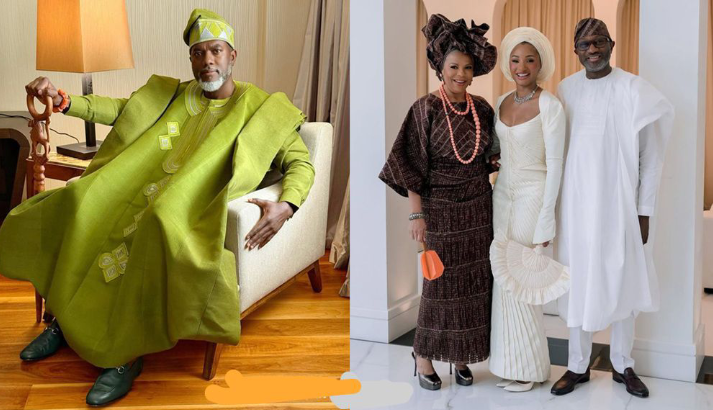
“Your Father Is A Pauper, Yet You Say You Can’t Submit” – Reno Omokri Shades Women While Reacting to Femi Otedola’s Counsel to His Daughter

The social media space in Nigeria has once again been set ablaze as former presidential aide and controversial commentator, Reno Omokri, stirred conversations with his latest remarks on marriage, submission, and wealth. Known for his sharp takes and unapologetic opinions, Omokri took to his verified platforms to throw shade at women who reject the idea of submission in marriage, making a direct comparison to the advice given by billionaire businessman, Femi Otedola, to his daughter. The remark, loaded with sarcasm and bluntness, quickly became the talk of the town, sparking both outrage and applause across different quarters of society.
Omokri, who has built a reputation for dropping what he calls “nuggets” on marriage, relationships, and success, did not mince words when he wrote: “Your father is a pauper, yet you say you can’t marry and submit to any man. Femi Otedola is a Dollar billionaire, but he publicly tells his daughter to submit to her husband as her boss. Think about that. Without submission in marriage, there will be division and ultimately a collision that can lead to a major disillusion and the dissolution of the union.” This post, in his typical fashion, was meant to serve as a lesson but it quickly snowballed into a heated debate about the role of women in marriage, the cultural expectations of submission, and how wealth or lack of it shapes people’s perspectives.
The backdrop to Omokri’s statement is a recent revelation by Nigerian billionaire businessman, Femi Otedola, who shared his counsel with his daughter, encouraging her to see her husband as her “boss” and to practice the principle of submission for peace and longevity in marriage. The words, coming from one of Africa’s richest men, carried weight and drew admiration from traditionalists who believe in age-old marital structures, while also sparking criticism from modern feminists who view such counsel as regressive and patriarchal. For Omokri, however, Otedola’s stance was the perfect ammunition to address a trend he has long condemned: women, especially from less privileged backgrounds, resisting the idea of male leadership in marriage.
Social media reactions have been divided. Supporters of Omokri argue that his point is a sobering reminder that humility and submission are not tied to wealth, but to values. To them, if a billionaire can encourage his daughter to embrace a traditional marital structure, then it becomes laughable when a woman from a struggling background insists on independence in a way that threatens the foundation of marriage. They echo Omokri’s warning that without mutual respect and submission, marriages will inevitably face chaos, leading to separation and broken homes. Many tagged his words as “harsh but true,” insisting that submission does not equate to oppression but to order and balance in a union.
On the flip side, critics wasted no time in calling out Omokri’s language, labeling it condescending and insulting to women. The phrase “your father is a pauper” particularly drew backlash as many accused him of classism and insensitivity. Feminist voices on social media accused Omokri of weaponizing poverty to shame women into silence and submission, thereby reinforcing harmful stereotypes that reduce women to subordinates in marriage. To them, Otedola’s counsel to his daughter, while his personal belief, does not set a universal standard for all marriages, and women should have the autonomy to define what partnership means in their own homes. They argue that marriage should be built on equality, not hierarchy, and that statements like Omokri’s perpetuate toxic gender roles that deny women their individuality.
The conversation has since spilled beyond the immediate remark into a broader societal discourse about gender, tradition, and the evolving face of marriage in Nigeria. Nigeria remains a deeply traditional society where cultural and religious teachings often emphasize male headship in the home. However, with increasing education, exposure, and advocacy for gender equality, more young women are beginning to challenge these narratives, seeking relationships that prioritize partnership over submission. Omokri’s statement has therefore become a flashpoint, highlighting the generational and ideological divide between conservative and progressive outlooks.
Observers note that Omokri is no stranger to controversy. Over the years, he has built an online persona as a social critic and “pastor of wisdom,” frequently offering advice that resonates with some while infuriating others. His critics accuse him of intentionally courting attention through provocative statements, while his supporters argue that his bluntness is necessary in a society where uncomfortable truths are often sugarcoated. Whether one agrees or disagrees with him, it is clear that his words never fail to spark national conversations.
In this instance, the use of Femi Otedola’s name further magnified the discussion. As one of Africa’s most prominent billionaires, Otedola’s counsel to his daughter was bound to attract attention. For Omokri to seize on that advice and contrast it with the attitudes of women from poor backgrounds added a fiery twist that ensured his comment would dominate headlines. The underlying message, according to Omokri, is that submission is a principle that transcends wealth and social status. Yet the backlash he faces shows that the subject of submission in marriage remains one of the most polarizing in Nigerian discourse.
Interestingly, some neutral voices have sought a middle ground, arguing that both Omokri and his critics are missing the point. They contend that submission in marriage should not be viewed as a one-way street, but as a mutual act of respect between partners. In their view, the biblical and cultural concept of submission has often been misinterpreted as female subjugation, whereas in practice, it should be about cooperation, understanding, and complementarity. They argue that marriages thrive not on rigid hierarchies, but on flexibility, communication, and love that allows both partners to feel valued.
Still, Omokri’s framing of the matter ensured that emotions ran high. By calling out women from poor backgrounds while elevating Otedola’s advice, he touched on sensitive issues of class, gender, and dignity that cannot be easily brushed aside. For some, it was an unnecessary insult disguised as counsel, while for others, it was a wake-up call laced with bitter truth. As the debate continues to rage, one thing is clear: Reno Omokri has once again succeeded in igniting a national conversation that cuts across social media platforms, homes, and even religious circles.
The ripple effect of his statement is unlikely to die down soon. Whether Nigerians agree with his choice of words or not, the conversation around submission in marriage remains relevant and pressing in a society struggling to reconcile tradition with modernity. For now, Reno Omokri has made his point, and in typical fashion, left the public to wrestle with its implications. His shade, wrapped in sarcasm but delivered with conviction, has exposed deep-seated tensions about how marriages are viewed and lived in Nigeria today.


